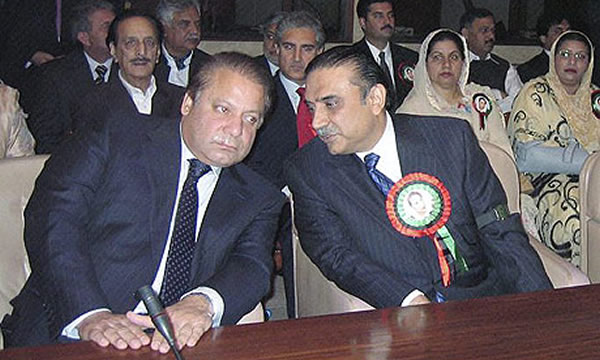
It is said that the imitation is the sincerest form of flattery. If this is the case, the recently displaced PPP government’s most admiring flatterer is none other than Nawaz Sharif. After taking control of the government since only a few short months ago, the PML-N chief has taken page after page from the PPP’s agenda, claiming it as his own.
After campaigning for years against the PPP government’s plans to increase energy tariff, finding himself in the role of Prime Minister has given Mian Nawaz a fresh view of economic policy and now the PML-N government itself is set to raise power tariff by up to Rs5 per unit.
Another issue that the PML-N leadership quickly came to appreciate a PPP policy they had previously campaigned against is in the area of international economic support. When the PPP was holding talks with IMF and other international organizations, Nawaz Sharif was loudly crying that ‘government with a begging bowl is not acceptable’. Shahbaz Sharif echoed this principle by declaring that ‘It is time to break the begging bowl and achieve self-reliance in the interest of complete independence’.
Obviously, that was then. Today, it is PM Sharif who finds himself holding the bowl as the PML-N government requests a $5.3 billion loan from the IMF. And in spite of declarations of achieving ‘self-reliance’, Nawaz has recently returned from China where he arranged for millions in economic aid, mostly in the form of loans that must be paid back.
Even the flag ship policy of Benazir Income Support Programme (BISP) has been appreciated by the PML-N government who has increased its allocation by 87.5 per cent for the fiscal year 2013-14.
In international affairs, too, the PML-N government is following closely the policies that were begun by the PPP government they replaced this year. Prime Minister’s Advisor on Foreign Affairs and National Security Senator Sartaj Aziz told reporters yesterday that ‘Pakistan is prepared to establish normal trade ties with India’, and he has assured the Americans of full cooperation in the war on terror.
It would be incorrect to take from this that there is no difference between PML-N and PPP, of course. And it is early in the new government’s tenure which could bring many changes yet to be seen. The real lesson, though, is in how much time was wasted while the PML-N created obstacles and division over policies that they themselves are now putting into place having been elected. Instead of working for the best interests of the nation, it appears that PML-N was acting in the best interests of its own.
As the PML-N continues to govern, this author hopes to see the PPP and other opposition parties take a new approach by supporting those policies that are in the best interests of the nation and opposing those that are truly harmful rather than playing political games with the lives of the people. That would be something we could all appreciate.
![]()





